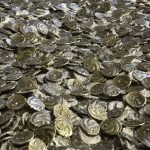- 0101.March.Wednesday

Trade Roots
We examine the evidence of the Island’s involvement in the transatlantic slave trade, including Jersey’s Lieutenant-Governor Sir George Carteret who was a founder member of the Royal Africa Company that traded in ivory, gold and enslaved people in the 17th century; Captain François Messervy of Jersey who was killed in 1722 during an uprising on board his slave ship off the coast of Africa; and Jersey trader Josué Mauger who in 1752 advertised enslaved people for sale in Nova Scotia, Canada, where his business was based.
This exhibition takes place in the Victorian House at Jersey Museum, with its impressive mahogany staircase, because new research has shown that the house was built partly on the profits of the transatlantic slave trade. ‘Trade Roots’ explores Jersey’s historic links to slavery, from Islanders who owned mahogany plantations overseas and traded in slave-produced goods, to those who campaigned for the abolition of slavery.
Thought-provoking, and at times challenging, this exhibition exposes some uncomfortable new stories from Jersey’s past and examines the legacy and impact of transatlantic slavery on the Island’s community today.
- 0101.March.Wednesday

WW2 Bunkers Tour
Join Jersey War Tours and visit WW2 bunkers, which are not usually open to the public.
JWT will show you how Jersey was made into an impregnable fortress and help you appreciate what the Third Reich was able to create with slave labour.
The tour is also a perfect complement to understanding the history of the D-Day invasion, which took place less than 30 miles away.
£35pp or you can go private for £175 for up to 7 people (just select the “book entire tour option”).
- 0101.March.Wednesday

The Jersey Plaquettes
Engraved stones found in Jersey are the the earliest art forms discovered in the British Isles
In 2010, 15,000 years after the first pioneer hunter-gatherers arrived in Jersey, archaeologists came to the area of Les Varines to the south-east of the Island, where stone artefacts had been discovered after the fields were ploughed. Excavations took place over the next eight years. They revealed hearths, paving stones of a camp and thousands of flint tools left behind by the hunters. Ten fragile fragments of engraved stone were also discovered, each marked with abstract designs. This display tells the story of the pioneer people, and investigates the meaning of these mysterious stones, which have been described as the earliest art forms to have yet been discovered in the British Isles.
- 0101.March.Wednesday

Vibrant Jersey Weddings
Just engaged? Looking to plan for your wedding? Once the thrill of becoming engaged has sunk in and you are able to peel your eyes away from the new addition on your finger, (well just for a second or two), it`s time to start making some very important decisions to kick start the planning of your dream day. We have listed many of our local suppliers & services below, to help you plan your big day.
- 0101.March.Wednesday

Searching for Jersey’s Celts
The world’s largest Celtic hoard was discovered in Jersey, this exhibition explores why people might have buried it there.
In 2012 the world’s largest Celtic hoard was discovered buried in a field in Jersey. This exhibition explores what might have led people to bury a hoard of 70,000 coins and jewellery in Jersey, 2000 years ago and looks closely at some of the items found within the hoard.
Explore the time when Roman armies marched through Europe, 2000 years ago, they left behind them a trail of death and destruction which almost wiped out the culture and civilization of the Celtic people who lived there. Using scientific and archaeological research we can learn more about the people that buried the hoard, about their lives and customs. Ground-breaking research can tell us more about the moment and the place the hoard was buried. It might even challenge some long-held ideas about why hoards were buried.







